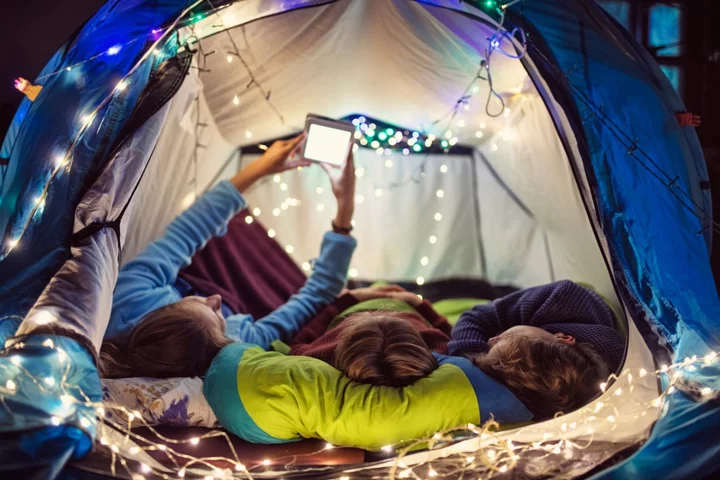
Some children avoid sleepovers due to fears of wetting the bed
Eight in 10 children who experience bedwetting have never attended a sleepover - because they’re too embarrassed. A survey of 742 adults, with children aged 4-11, found that 69 per cent of kids have turned down an invite to a sleepover party. And nearly as many (67 per cent) of parents have declined an invitation on behalf of their child. To help parents and kids deal with the experience, and help kids make friends and gain independence through sleepovers, Pampers Ninjamas teamed up with Dr Ranj Singh on educational and fun content discussing bedwetting, and how to prepare for nights out of the home. The three-part series provides education about why bladder leaks can happen, as well as practical tips on how to manage them, particularly during sleepover moments. Paediatrician, TV presenter and author Dr Ranj, said: “Sleepovers can play an important role in developing the confidence and independence of children, as well as for their enjoyment. “So I am proud to be helping the 82 per cent of children who are currently missing out, to offer practical advice as to how to better prepare for overnight stays with friends and family.” The research also found more than a quarter (26 per cent) of respondents are not comfortable discussing bedwetting with parents hosting sleepovers. And 35 per cent report an increase in bedwetting before going back to school, suggesting scholastic stress could be a trigger. To combat the situation, 76 per cent have invested in a waterproof mattress, while 68 per cent have purchased nappies for older children. Read More Playing with dolls could help a child’s social development Study finds free childcare reform has ‘little benefit’ to poorer families Most children in kinship care living with at least one grandparent, figures show
2023-09-28 17:50
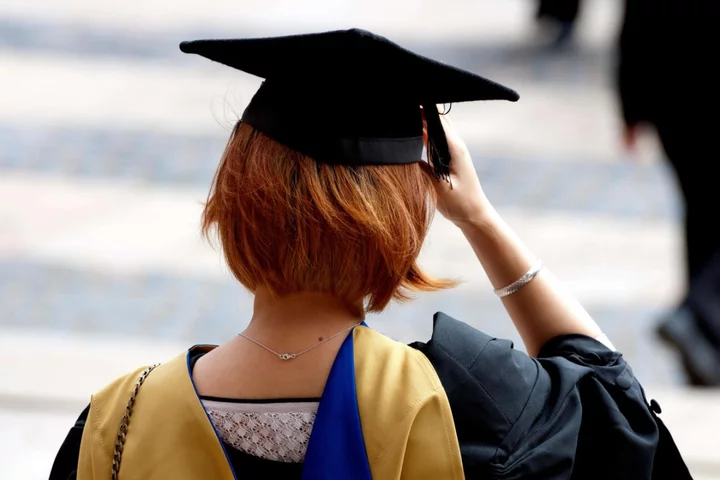
Female students ‘more than twice as likely’ to be affected by poor mental health, research shows
Female university students are more than twice as likely as male students to say they have been affected by poor mental health, new analysis suggests. Data shows 12% of female students say they have been affected, compared to 5% of males. Reported mental health problems among university students have almost tripled in recent years, according to the analysis. The percentage of undergraduate students at universities across the UK who said they had experienced mental health difficulties rose from 6% to 16% between the 2016/17 and 2022/23 academic years. It means one in six undergraduates now reports experiencing mental health challenges. The findings suggest further action should be taken to prevent mental health difficulties arising wherever possible, and that services are adequately resourced to support students quickly when they need help Professor Michael Sanders, King’s College London Analysis by the Policy Institute at King’s College London and the Centre for Transforming Access and Student Outcomes in Higher Education (TASO) found a significant part of this increase occurred in the last 12 months, a period during which the cost-of-living crisis intensified. Poor mental health is by far the most common reason for students wanting to drop out of university. Among those considering dropping out, the proportion citing financial distress as the main reason has risen from 3.5% to 8% between 2022 and 2023. But the general upward trend in mental health problems predates both the rise in inflation and the Covid-19 pandemic, indicating that other factors are likely to be at play, researchers said. The analysis – which drew on a dataset of 82,682 full-time UK undergraduates over seven years – shows some groups are more affected than others. Of the non-binary respondents, 42% said they have been affected by poor mental health, along with 30% of trans people. Bisexual people (28%) have the highest average levels of mental health difficulties among LGBTQ groups across the data, while gay men (14%) have the lowest – although this is still greater than the level seen among straight people (7%). White students (12%) have on average worse mental health than their peers from other ethnicities, but those with a “mixed” ethnicity (12%) are just as likely to have mental health difficulties. Undergraduates who attended state schools (15%) have on average worse mental health than their peers who attended private school (11%), while students who get most of their money through a maintenance loan, grant or paid work are more likely to have mental health difficulties than those on scholarships or with family support. Michael Sanders, professor of public policy at the Policy Institute and author of the study, said: “It’s clear the experiences of mental ill-health among students are deeply unequal, and exist along much the same lines as in society at large, with those from the most disadvantaged backgrounds or who often face discrimination being most likely in general to report struggles with their mental health. “The findings suggest further action should be taken to prevent mental health difficulties arising wherever possible, and that services are adequately resourced to support students quickly when they need help.” Dr Omar Khan, chief executive officer of TASO, said: “This report highlights the persistent and widespread mental health challenges faced by students. “While Covid and the cost-of-living crisis have clearly exacerbated such challenges, the upward trend is not new. “We’re working with the higher education sector to better understand what works to improve mental health outcomes for all students.” It comes as a separate report from the NHS Race and Health Observatory calls for more mental health support for people from Gypsy, Roma and Traveller Communities in England. It said that it is estimated that suicide rates among these groups are up to seven times higher than in other communities. Dr Habib Naqvi, chief executive of the NHS Race and Health Observatory, said: “We know that Gypsy, Roma, and Traveller communities face stark challenges in accessing psychological therapies and other mental health services. “This report lays bare the mental health issues and stigma faced by these communities first hand.” Read More Charity boss speaks out over ‘traumatic’ encounter with royal aide Ukraine war’s heaviest fight rages in east - follow live Many parents of under 5s on less than £50k ‘quit work due to childcare costs’ – survey 5 trainer trends that will be everywhere this autumn 11 ways to work autumnal wonder at home
2023-09-28 16:49
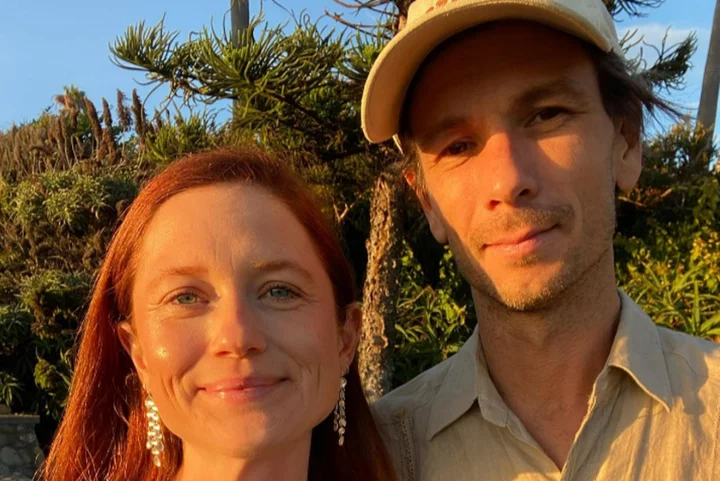
Harry Potter star Bonnie Wright announces birth and name of first child with Andrew Lococo
Bonnie Wright has announced the birth of her first child, sharing the baby’s name and first photo with her social media followers. The 32-year-old actor is best known for playing Ginny Weasley in the Harry Potter film series, which concluded in 2012. In April, she and her husband Andrew Lococo told fans that they were expecting their first child together. On Wednesday (27 September), Wright shared that she’d given birth at home last week, along with a photo of the newborn asleep under a blanket. “Say hello to Elio Ocean Wright Lococo, born at home on Tuesday 19th September,” Wright’s caption began. “We’re all healthy and happy. Andrew and I are so in love with our sun,” she wrote, adding a sun emoji. She continued her caption by praising the doula, midwives, doctor and other maternity professionals for their “amazing” work. “So grateful for our birth team that have held our hands throughout and made the journey so joyous and expanding,” Wright continued. “Birth is the wildest experience!” The actor and writer concluded her caption with a short tribute to Lococo. “Lastly thanks to Andrew my rock throughout birth quite literally as I squeezed onto you so tight and you never wavered. Elio has the most tender loving papa.” In response to the post, many fans and friends of the film star shared warm wishes in the comment section. Evanna Lynch, who played quirky Hogwarts student Luna Lovegood in four Harry Potter films, is one notable figure to have left a congratulatory message – and pointed out an unexpected link to the wizarding franchise. “Awwww congratulations Bonnie and Andrew!!! Welcome to Earth, Elio Ocean!!! ps. Hermione’s birthday twin, I’m sure you’ve been told!!” the Irish actor wrote. Others were quick to make references to the film series, with several naming the birth as the arrival of “another Weasley”. In August, Wright posted photos and video from her and Lococo’s “baby moon” in Laguna Beach, California, as they celebrated their “last quiet holiday as just two”. The couple married on 19 March 2022, a day that Wright has since described as “the best day of my life”. In an interview with Brides magazine earlier this year, she spoke about how her passion for sustainability was reflected in their choices for the ceremony, as well as in her vintage, century-old wedding dress. “The dress didn’t have the original underdress with it as it had likely perished – it being 100 years old!” she explained. “So when I was first trying it on, it was completely see-through. It was quite funny having to imagine the underdress we would end up making for it.” Read More Bonnie Wright admits feeling ‘anxious and frustrated’ by Harry Potter screen time Harry Potter star Bonnie Wright shares new details about her 100-year-old wedding dress Harry Potter star Bonnie Wright announces she’s pregnant with her first child Nick Cannon candidly admits Mariah Carey saved his life amid lupus diagnosis The best napping method to help with pulling an all-nighter Toys children play with can have an effect on their success in adulthood
2023-09-28 15:25
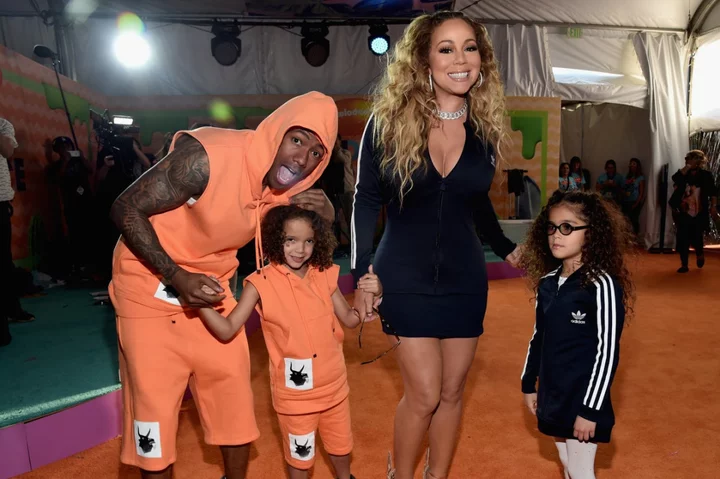
Nick Cannon candidly admits Mariah Carey saved his life amid lupus diagnosis
Nick Cannon has revealed the appreciation he has for ex-wife Mariah Carey during a difficult time. In a recent interview on the Diary Of A CEO podcast, the father of 12 wasn’t afraid to confess that he wouldn’t have survived his 2012 lupus diagnosis if it wasn’t for the “Without You” singer by his side. “She was my rock,” he admitted. “She went hard. To be honest, I probably wouldn’t be alive if it wasn’t for how hard she went with the doctors, with me, my stubbornness.” The Grammy winner, 54 and the former America’s Got Talent host, 42, saw sparks flying almost immediately when Carey cast Cannon as her love interest in the 2008 “Bye Bye” music video. It only took six weeks from the time they got engaged for Carey and Cannon to tie the knot. In 2011, they welcomed fraternal twins Moroccan and Monroe. Unfortunately, Cannon was diagnosed with lupus one year later - an inflammatory disease which occurs when the immune system attacks its own tissues. The Masked Singer host described Carey as “the perfect helpmate, the perfect matriarch, the perfect mom, the perfect wife” during this time. “It probably took a toll on us just because of the person I was in my head and the struggles that I was dealing with,” he continued. “But it definitely brought us closer together.” When podcast host Steven Bartlett asked whether Cannon believed Carey “saved his life”, he simply responded: “I absolutely do.” “But that’s what you do when you find a helpmate. When you find someone that you’re in matrimony with, you go hard for [them],” Cannon pointed out. “I feel like I went hard for her and we’ll still go hard - I lay down my life for her today. That’s what you do, it’s just family.” Cannon went on to explain how his experience with the disease put many things into perspective for him. However, it wasn’t easy for him to see things clearly while he was struggling. In fact, he told Bartlett that he was also dealing with mental health issues at the time, such as questioning his purpose and effect on the world. “Staring up from the hospital bed, staring at the ceiling all alone when everybody else is kicked out, and you gotta be face to face with your higher power, asking all those tough questions. Am I done?” he explained. “A lot of people don’t do that because we get caught up in the constant race of just living day to day, but it slowed down for me on many occasions.” While it may have been difficult for him to comprehend at the time, Cannon said he now lives his days with direction and without fear. “I’m probably reminded of my physical mortality all the time,” he noted. “And when you’re not afraid of dying, you focus on living, you know?” This isn’t the first time the TV personality has praised the “All I Want for Christmas Is You” singer. In 2022, Cannon opened up to Entertainment Tonight about the gratitude he has for his time spent with Carey. “I was talking about the fantasy of it all. I was like: ‘Yo, if I could have that same vibe of where I was at that state in my life and that age, of course I would do that all over again,’” he said. “But I’m not.” In addition to his two children with Carey, Cannon has welcomed Rise, Powerful, and Golden, with Brittany Bell; Zion, Zillion, and Beautiful with Abby De La Rosa; Halo with Alyssa Scott; Legendary with Bre Tiesi; and Onyx with LaNisha Cole. Cannon and Scott lost their baby boy, Zen, to cancer in 2021 when he was only five months old. Read More Nick Cannon’s brother says he can’t remember the 12 names of his nieces and nephews Nick Cannon shares Mariah Carey’s ‘high frequency’ reaction to actor having 12 children Mariah Carey: 'Music was my escape' The best napping method to help with pulling an all-nighter Toys children play with can have an effect on their success in adulthood Summer of female sporting events inspires millions of women to get back into the game
2023-09-28 03:26
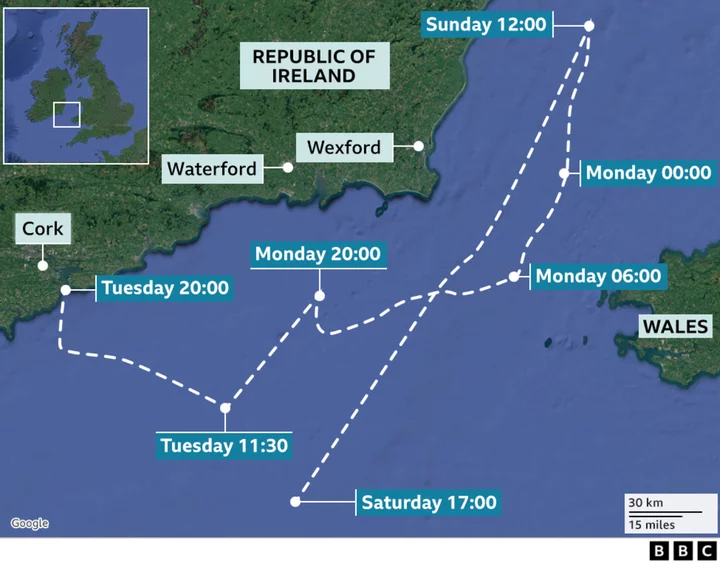
Largest ever Irish drug seizure after ship raided
Irish authorities say that more than €150m of suspected cocaine has been seized from a cargo ship.
2023-09-27 20:54
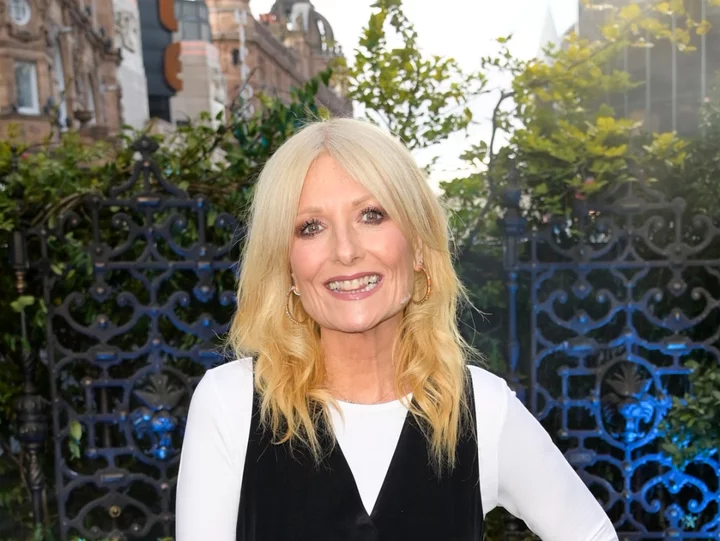
Gaby Roslin says she’ll ‘never apologise’ for saying she’s happy post-divorce
TV presenter Gaby Roslin has said she will “never apologise” for telling people she’s happy, after she experienced moments of grief following her divorce. The former The Big Breakfast presenter and author, 59, was married to musician Colin Peel for almost a decade. They share a daughter together. “Not all my life has been joyful. My mum died young. I’ve been through divorce and lost some of my dearest friends,” she told Prima magazine. “You go through those things and you realise that life is precious and, without sounding trite, I will never apologise for saying I’m happy.” Roslin’s mother died just over 20 years ago, around the time she was beginning a new job. The TV star said that it feels like she and her husband of 18 years, David Osman, “fit together”. She shares another daughter with Osman. “We still really appreciate what we have,” Roslin, who presents a show on BBC Radio London along with sints on BBC Radio 2’s The Zoe Ball Breakfast Show and BBC One’s Morning Live, said. “The things that makes it work is that we’re not in competition with each other: We’re very, very different.” Speaking about how “life is crappy for a lot of people”, she added: “I’m someone who has always been very positive and full of laughter, but I’m aware that it’s not something everyone can hold on to. “There are coping mechanisms that have helped me, and I know they can help others, too.” Roslin revealed that some of her personal coping mechanisms have included giving up alcohol five years ago, and going for walks. “There’s a lot of ageism out there,” she said. “It’s no secret in my industry, but it’s everywhere. You can’t do this or that if you’re a certain age. No! I’m lucky that I’ve carried on working, but I have friends who have experienced it. “I know an actor who, at 55, was going for the part of someone older than her and was told that she was too old. They cast a 40-year-old. That’s so wrong.” Roslin is preparing to release her new guided journal, Spread The Joy: Simple Practical Ways To Make Your Everyday Life Brighter, which focuses on stories, illustrations, anecdotes and tips and tricks. The full interview is available now in Prima’s November issue in supermarkets and online at Mags Direct. Additional reporting by Press Association. Read More Sophie Turner and Joe Jonas reach agreement after child custody row Who is Laura Gallacher, Russell Brand’s wife of six years? Everything we know about Katy Perry and Russell Brand’s short-lived marriage Why is my teenager sleeping so much? Sounds that can help you fall asleep better Holidays to the homeland could help children hold onto family’s original language
2023-09-27 18:16
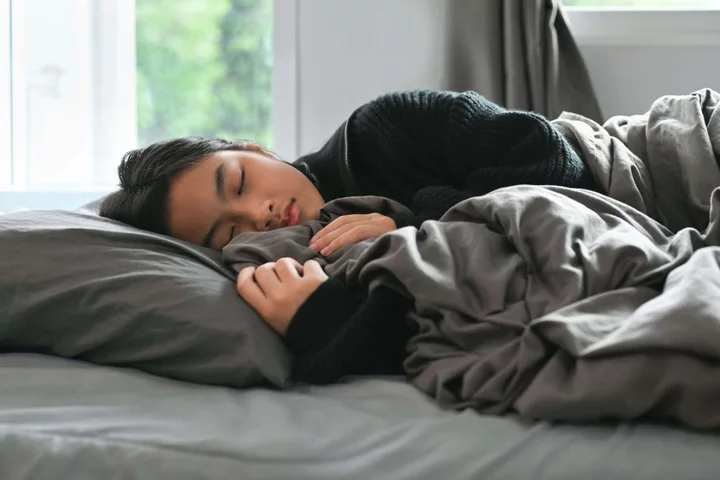
Why is my teenager sleeping so much?
When you think about it, teenagers are a lot like pandas. Like the black and white bears, teens often have a tendency to lounge around for hours, munch their way through massive amounts of grub, and snooze for extremely long stretches. It’s not unusual for youngsters to emerge zombie-like from their bedrooms hours after parents and little ones have arisen on weekend mornings, or have a ‘disco nap’ in the afternoon. But how can you tell if your child’s sleeping habits or typical for a teen – or a cause for concern? How much do teens need? “Sleep research suggests that a teenager needs between eight and 10 hours of sleep every night, so slightly more than an adult or younger child requires,” says Dr Hana Patel, sleep expert at Time4Sleep. “This is because teenagers need additional sleep to support their rapid physical, intellectual, and emotional development.” Chris Tattersall, sleep expert and MD of Woolroom explains: “They are going through a second developmental stage of cognitive maturation. Additional sleep supports their developing brain, as well as physical growth spurts.” However, it’s estimated that most adolescents in the digital age only get about 6.5 to 7.5 hours sleep. Tattersall says: “With the increased use of social media scrolling before bedtime, this is affecting thousands of teenagers’ sleep because the blue light from screens suppresses melatonin levels and delays sleepiness.” What happens if they don’t get enough sleep? “Teenagers not getting enough sleep can lead to all sorts of potential issues,” says Tattersall. Psychological symptoms may include, he warns: “Depression, difficulty concentrating, memory loss, anxiety and low self-esteem.” Plus, there’s the risk of weight gain due to eating more sugary foods to combat tiredness. “Not only does it have negative effects on their general wellbeing but it can also affect their academic performance,” Patel adds. Is it possible to sleep too much? It may seem counterintuitive, but sleeping too much can actually make young people more tired. “Anything over eight to 10 hours of sleep for teens could be considered excessive and may cause daytime sleepiness,” says Patel. “This can negatively affect interpersonal relationships, extracurricular activities, general health and, for older teens, driving too.” It’s important for parents to watch for signs that teens are struggling with sleep. “Look out for concentration difficulties, shortened attention span, memory impairment and lack of enthusiasm or energy,” Tattersall says. “You also might notice moodiness and aggression, poor decision-making, and signs of depression.” Patel says: “Sometimes teens may also complain of symptoms like headaches and migraines.” Try to encourage good ‘sleep hygiene’ in terms of a youngster’s evening routine, meaning avoiding large meals and caffeine before bed and creating a relaxing bedroom environment. “If possible, reduce the use of devices like smartphones and tablets, TVs or computers in the bedroom at night, as the light from the screens interfere with sleep,” Patel says. “If you are concerned about your teenager’s sleeping habits and the effects of this on their health, consult with your GP.” Read More Charity boss speaks out over ‘traumatic’ encounter with royal aide Ukraine war’s heaviest fight rages in east - follow live Kate gives a lesson in autumnal power dressing in a green trouser suit How can I boost my soil when I go peat-free? See Cate Blanchett champion sustainable fashion at glamorous Giorgio Armani show
2023-09-27 16:26
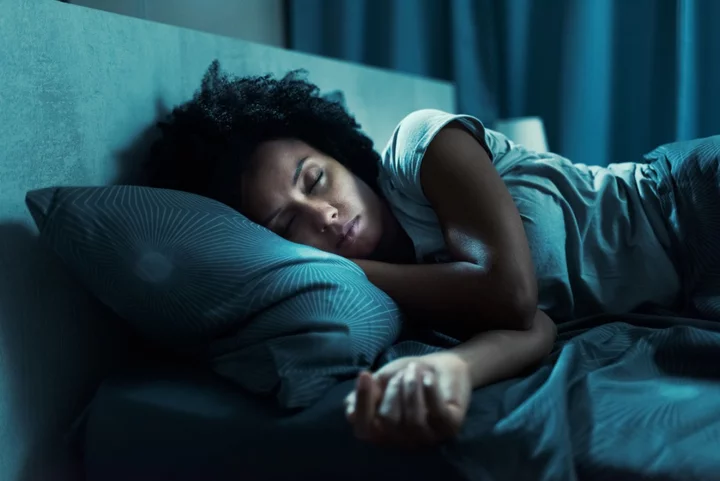
Sounds that can help you fall asleep better
A sleep expert has revealed which sounds help you get to sleep – and which ones are the best to wake up to. Sleep expert Hannah Shore claims ocean waves, a crackling fire and the distant buzzing of a fan are among the top ten sounds that help people fall asleep. Whereas hearing a piece of toast being cut or a kettle boiling is most likely to make them rise and shine gently. It comes after a poll which looked at 2,000 adults, found half enjoy listening to white noise to go to sleep or wake them up. The study, commissioned by Premier Inn, found 26 per cent listen to it every night, with rainfall sounds (40 per cent), music (34 per cent) and the sound of a fan (24 per cent) among the top choices. The hotel chain has launched Nod-Flix: an ASMR channel where guests can have their optimal video and soundscape play as they drift off. Hannah Shore, who is working with the hotel brand in partnership with Silentnight, said: “Depending on the individual, watching or listening to something calming before bed can be part of our sleep process. “Different sounds generate different responses from our subconscious when we’re asleep, so what might be soothing to one, might not be for another. “If you’re sharing a bed or a room, be considerate and invest in a pair of headphones or why not try finding a sound that you both find soothing?” The study also found that if they are sharing a room with other people and unable to listen to their white noise, 27 per cent wouldn’t be able to sleep properly as a result. More than half (58 per cent) normally listen to these sounds or noises on their phone, while 34 per cent tune in via an app. But 15 per cent even have a sound machine. Wind sounds (21 per cent), audiobooks (16 per cent) and a cat purring (seven per cent) also made the list of sounds and noises people like to fall asleep to. It also emerged half of the adults polled feel their sleep varies depending on the season we’re in. And 57 per cent reckon they sleep the best during autumn or winter, compared to only seven per cent who get the best shut-eye over the summer months. Respondents were shown a number of hotel-inspired ASMR type videos from the Nod-Flix channel, from the kettle boiling to a suitcase being pulled along hard floor. It found the sound of sizzling bacon was found to be most relaxing, followed by the trickle of running water from the shower. The study carried out via OnePoll.com, also revealed the sound of a vacuum was surprisingly least calming. Hannah Shore, for Premier Inn, added: “Switching off does not come as easy to some people as it does others and sounds are a great way to help with this. “Some people prefer complete silence whereas to others the silence means they listen out for all the little sounds, in a hotel this can be people walking down the hall, doors closing, the lift. “Others may find they need their brain to concentrate on something else, in these cases there needs to be something in the sounds they can focus on like the slow rhythm of calming music, the repetitiveness of waves lapping on the beach or even the noise of the TV. “This can allow the mind to switch off from the day and therefore allowing you to fall asleep, which we hope the Nod-Flix channel will accomplish for many.” Some noises that help Brits sleep better: Rainfall sounds Music Ocean sounds The sound of a fan The sound of favourite TV show/ streaming service Wind sounds Podcasts Audio Books Jungle/forest/woodland sounds Fireplace sounds Static sounds City ambience Animal sounds A cat purring The sound of a vacuum cleaner Here are some tips for a restful sleep: If you’re going to watch something before bed, make sure it’s calming content Keep the space you’re sleeping in tidy Don’t eat a heavy meal before bed Invest in some bed socks – they help increase blood circulation Make sure your pillow supports your sleeping position Dim the lights – it helps our bodies to produce sleep hormones like melatonin Get some black out blinds or curtains to block out bright lights White noise such as fans, hairdryers, hoovers are great for blocking out sound. If you want to go to sleep in a calmer way, pink noise is also good - think of wind, steady rain and reselling leaves. Green noise is similar to pink but will have an undertone of more constant hissing noise but still nature led such as running streams. To help you focus throughout the day, brown noises such as the crack of thunder which have deeper tones works really well. Read More Sleep expert reveals the simple secret to a good night’s rest Irregular sleep patterns linked to harmful gut bacteria, study suggests What is the 10-3-2-1-0 sleep method? How to spend the perfect healthy Super Saturday – according to science Holidays to the homeland could help children hold onto family’s original language The cure for smelly garlic breath? Turns out, it’s simpler than you think
2023-09-26 20:22

Yoghurt could be the cure for bad garlic breath, study finds
It’s hard to resist garlic sometimes, but its pungent smell can often last long on the tongue and what better way to get rid of it than good old yoghurt? Garlic contains a compound called sulfur volatiles that can cause a bad odour after being eaten. Researchers wanted to better understand how yoghurt and its components can eliminate or reduce such strong odours. For the study, researchers from the Department of Food Science and Technology at Ohio State University, Columbus tested the garlic deodourising capabilities of yoghurt and its individual components of water, fat and protein to see how each stood up to the smell. As a result, the team found both fast and protein were effective at trapping garlic odours, leading the scientists to suggest high-protein foods may one day be formulated specifically to fight garlic breath. “High protein is a very hot thing right now – generally, people want to eat more protein,” said senior study author Sheryl Barringer, professor of food science and technology at the university. “An unintended side benefit may be a high-protein formulation that could be advertised as a breath deodorizer in addition to its nutritional claims,” she said. “I was more excited about the protein’s effectiveness because consumer advice to eat a high-fat food is not going to go over well.” In the lab experiment, researchers placed equal amounts of raw garlic in glass bottles and confirmed the smell of the garlic was released in concentrations that would be detected by the human nose. Scientists measured the levels of volatile molecules in gaseous form present before and after each treatment. It was revealed that garlic alone reduced 99 per cent of the major odour-producing raw garlic volatiles. When introduced separately, the fat, water and protein components of yoghurt also had a deodorising effect on raw garlic, but results showed fat and protein performed better than water. Looking at fat’s performance, a higher quantity of butter fat was more effective at deodorisation. The proteins which were studied included different forms of whey, casein and milk proteins, all of which were effective at deodorising garlic. This may be because of their ability to trap the volatile molecules before they are emitted into the air. A casein micelle-whey protein complex performed the best. “We know proteins bind flavour – a lot of times that’s considered a negative, especially if a food with high protein has less flavour. In this case, it could be a positive,” Barringer said. Additional experiments that involved changing the pH of the yoghurt to make it less acidic (4.4 pH to 7 pH) actually appeared to lower the yoghurt’s deodorisation effect on the garlic. However, changing the pH of water did not seem to make any difference on the water’s deodorization effect. “That’s telling me it goes back to those proteins because as you change pH you change the configuration of proteins and their ability to bind. That said we definitely should be looking at these proteins,” Barringer said. “It probably depends on the protein, as well, because different proteins react differently to pH. So that may be an important thing as we look at other proteins for their garlic deodorization effect.” The team also tested the deodorising effect of yoghurt and its components on fried garlic, in the process they found that drying garlic alone can significantly reduce garlic odour. Yoghurt and its individual ingredients neutralised a lower percentage of volatile compounds of fried garlic compared to raw garlic. Study authors think this may be because there were fewer volatiles to trap than were present in the raw cloves. The findings have provided a foundation for future studies on proteins that might help fight the garlic breath. In the meantime, Barringer predicts that Greek yoghurt, with a higher protein profile than the whole milk plain yoghurt used in the study, may be particularly effective at getting rid of garlic breath. Fruit-flavoured yoghurts will probably work, too, she said – and whatever is used, it must quickly follow ingestion of raw garlic. “With apples, we have always said to eat them immediately,” she added. “The same with yoghurt is presumed to be the case – have your garlic and eat the yoghurt right away.” The study was published in the journal Molecules. Read More 11 best mouthwashes that will keep your mouth minty fresh Women less likely than men to receive CPR from strangers, study finds Study finds toxic ‘forever chemicals’ may be ‘intentionally added’ to some period products Yoghurt could be the cure for bad garlic breath, study finds Teenager’s death after drinking too much water was ‘preventable’ Could bats hold the secret to beating Covid and cancer?
2023-09-25 17:56

Ukraine war: How Zelensky is grappling with Western war fatigue
Ukraine’s leader has always been comfortable campaigning for help - now he’s having to negotiate.
2023-09-24 08:25

Ukraine war: US to give Kyiv long-range ATACMS missiles - media reports
Kyiv has been long pushing for ATACMS missiles capable of hitting Russian targets far behind the front line.
2023-09-23 08:58
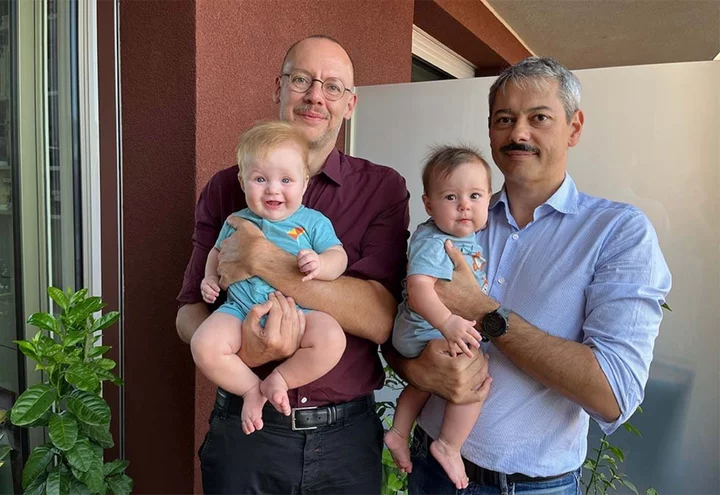
‘The state says our kids don’t exist’ - how LGBT life is changing in Italy
Italy is removing children from registers and stopping surrogacy abroad in new rules affecting same-sex couples.
2023-09-23 08:29
